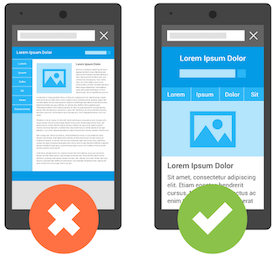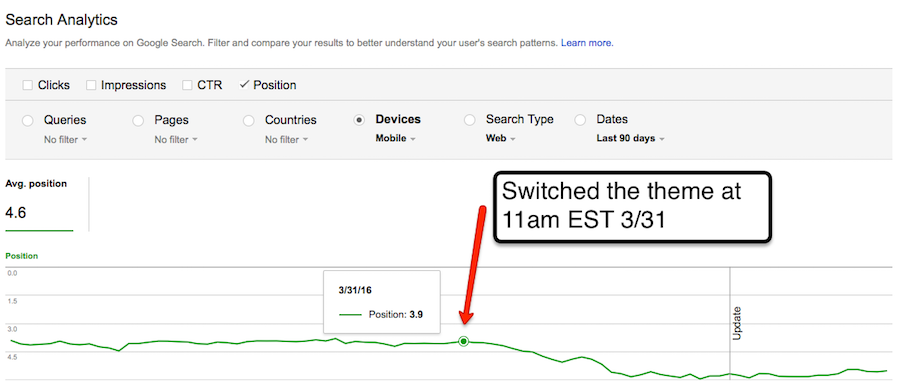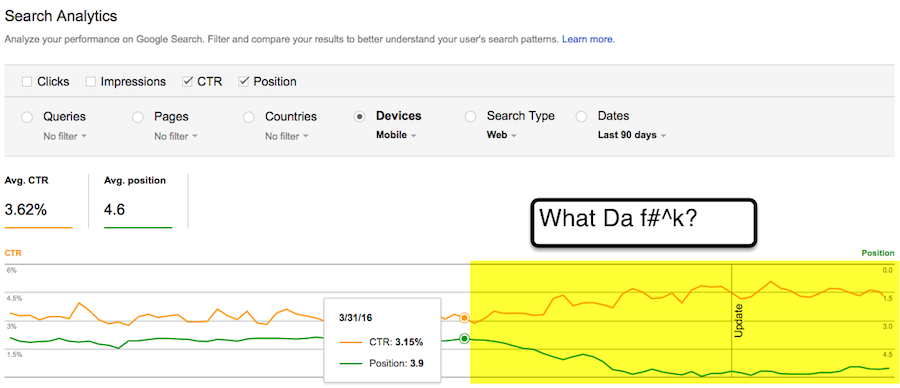 When it comes to announcements from Google and their advice in general I’m not one to follow blindly. I’ve always tried to run my own tests and let the data guide my actions. With the Mobile friendly scare (Mobilegeddon) it seemed like just another shake up to me.
When it comes to announcements from Google and their advice in general I’m not one to follow blindly. I’ve always tried to run my own tests and let the data guide my actions. With the Mobile friendly scare (Mobilegeddon) it seemed like just another shake up to me.
Don’t get me wrong, I realize how important mobile is from a user and conversion standpoint. But with all this Mobilegeddon FUD we’re talking purely about SEO, not conversions and user experience. Some could counter and say user experience ultimately will benefit SEO but that’s more a long term factor. Today I’m going to show the results I’ve experienced from switching an established site from non-mobile to a mobile friendly design.
The biggest task was migrating a lot of customization I had on the old theme. Custom post types, post templates, archive templates, functions, etc.
At the end of it all I was hoping to see at least some sort of positive gains on mobile, like come on guys you promised it would move the needle! But just like my pessimism with the SSL scare, I wasn’t expecting the results to knock my socks off. Well now I’m looking at the results and scratching my head.
If I made the switch properly to mobile responsive and mobile errors drop like a rock in search console, then shouldn’t average rankings on mobile follow along? Well I’m seeing the exactly the opposite. The first report we’ll look at is “Mobile Usability” in the Search Console.

So far so good, there are still some errors showing but that is because I’m running a vbulletin forum on the site. For the main site though 95%+ of the mobile issues have been resolved from switching themes.
The next report I’m showing is from Search Console > Search Analytics. I ticked position only, then device type Mobile, Date last 90 days. You’ll also see the day the theme changed (3/31) is highlighted.

Well that blows ass. Your guess is as good as mine why rankings have dipped slightly. I wasn’t expecting to be retiring from the change but I definitely didn’t expect a decrease.

Prior to the switch average position was 4.0. Now it’s averaging 5.7, son of a bitch!
And CTR has actually increased over this time.

Mobile issues down, CTR up, rankings down. What in the f^*king f^*k?!! At this point I realized one positive thing from this. I could write this post and show you things aren’t as cut and dry as Google tell us. Now I might get a storm of angry technical SEOs coming at me but I’m cool with that. Surely a theme switch can cause all kinds of technical SEO issues making it not as simple as the reports I’ve shown here. But I’m not exactly a noob when it comes to technical SEO so I’m confident my work for the most part.
The conclusion isn’t that mobilegeddon is total bullshit it’s that you can never just blindly follow Google’s advice.
The reason I made this switch was not for the SEO gains. It was for the improved user experience and ability to run responsive Adsense.
I’m happy to say that adsense revenue has increased slightly so at least something is moving in the right direction. I’m more happy that I didn’t let google bully me into making this change until I was ready to.
The last thing to consider is depending on the complexity of your site, changing your WordPress theme isn’t as simple as click upload and activate. For me it was a huge process. I cloned my entire site offline to work on the theme and make it perfect before actually switching. I also had quite the checklist of things to take care of after the actual change.
Regenerate thumbnails – My new theme used a different thumbnail size, this required regenerating them with a plugin.
Robots.txt double check – Something I noticed by accident. My old robots file had this line which caused some issues on the new theme:
Disallow: /wp-content/
Well the problem is the blocks you .js and .css files in your plugins which was screwing up my cache.
Monitored Search Console and Analytics – I’ve obviously been taking a close look at the Search console making sure nothing got messed up. 404s, traffic, desktop vs mobile, bounce rate, etc.
Of course it’s possible I missed a detail that’s causing this decline and the investigation will be ongoing. It’s no easy task to switch to a mobile responsive theme. In fact it was a complete pain in the ass and opened several other cans of worms for me. Am I glad I switched? Yeah it had to be done but obviously it hasn’t been a total gravy train.
What has your experience been? Have you worked on switching a medium to large sized site to mobile responsive? If so, I’d love to hear about it. The comments, there you can make my dreams come true.
The only experience I have with mobile was redesigning a very large corporate site and pushing an old, shitty M-dot site to responsive. We immediately saw a huge mobile traffic boost. While that is only one anecdotal experience, the main thing I liked about that process was that it was measured with Omniture as they have those fat corporate stacks to pay for it.
The only issue I have with this case study is that we all know that both the Search Console and Google Analytics seriously blow on the accuracy front. I’m pretty Google keeps that shit wildly inaccurate on purpose…why would they give such valuable information for free?
When comparing SC with Analytics, I consistently see ~300% difference with their click data and organic entries (as a whole and by URL) and it is even higher when comparing it with Omniture. Their position tracking is equally suspect, it would be cool to see what SEMRush, SERPWoo, and Ahrefs position tracking had to say as well. While I generally agree with the conclusion, my experience with migration (while narrow) showed the opposite.
It would be pretty cool to see another case study on SSL, that post is rapidly reaching the 2 year old mark and that is ancient in this industry. I recently migrated a small, medium, and large site to HTTPS and saw significant improvements in traffic, ranking positions, and number of ranked KWs.
Yeah I need to pull some more data, I was going to show the SEMrush mobile graph but I was thinking it hasn’t been long enough for it to fully update. Here it is anyway.
As you can see it has remained constant according to that. Unfortunately I wasn’t tracking any rankings on mobile with my personal tracker, just desktop.
So my experience (from a super limited number of sites) but still helpful to the conversation.
Type of Site:
Local Businesses Where their competitors were not mobile optimized
->After Mobile optimization saw on average a 10 position jump (page 2 to page 1)
Local Businesses where competitors WERE mobile optimized (even if it was a redirect like m.xyz.com or if the mobile site totally blowed)
-> No change
Fairly large e-commerce site no mobile optimized competitors
-> No movement at all
This was my personal site and it made me super angry mode that there was no change…
Awesome thanks for the input! Decent sized site like I was working on made it difficult not to break other stuff causing issues. Still a work in progress.